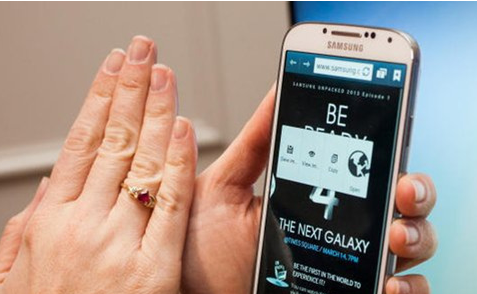Gesture That Smartphones Can Appreciate,Newscientist,May 17th,2013
ТЎ║УЃйТЅІТю║УЃйУ»єтѕФС║║у▒╗уџёТЅІті┐№╝їТќ░уДЉтГдт«ХуДЉТіђТЮѓт┐Ќ№╝ї2013т╣┤5Тюѕ17ТЌЦ
Nowadays, there is a device that enables a smartphone's camera to recognise gestures without gobbling up precious battery life.
уЏ«тЅЇ№╝їТюЅСИђуДЇУ«ЙтцЄтЈ»С╗ЦСй┐ТЎ║УЃйТЅІТю║уџёТЉётЃЈтц┤У»єтѕФС║║у▒╗уџёТЅІті┐№╝їУђїСИћСИЇС╝џС╗ЦтЄЈт░ЉућхТ▒ауџёт«ЮУ┤хт»┐тЉйСИ║С╗БС╗исђѓ
Microsoft's Kinect and the soon-to-be-released Leap Motion have thrust 3D gesture-recognition technology into the mainstream. Touchless phones№╝їhowever№╝їare still a rarity.
т░йу«АжЮъТјЦУДдт╝ЈТЅІТю║С╗ЇуёХжЮътИИуйЋУДЂ№╝їтЙ«Уй»уџёKinectтњїтЇ│т░єУдЂтЈЉтИЃуџёLeap MotionСй┐3DТЅІті┐У»єтѕФТѕљСИ║С║єСИђуДЇСИ╗ТхЂТіђТю»сђѓ
Korean company Pantech released a smartphone in 2011 that could use it's camera to recognise simple gestures.
жЪЕтЏйТ│ЏТ│░тЁгтЈИтюе2011т╣┤ТјетЄ║уџёТЎ║УЃйТЅІТю║тЈ»С╗ЦСй┐ућеуЏИТю║У»єтѕФу«ђтЇЋуџёТЅІті┐сђѓ
But across the industry the capability has yet to catch on:
СйєтюеТЋ┤СИфУАїСИџ№╝їУ┐ЎжА╣ТіђТю»У┐ўТюфуЏЏУАїсђѓ

of the 1.6 billion mobile devices shipped in 2012, just 27 million (about 0.2 per cent) were equipped with gesture-sensing technology,according to ABI Research№╝їa market research firm based in New York.
ТЇ«Тђ╗жЃеСйЇС║ју║йу║дуџёABIтњеУ»бтЁгтЈИуџёУ░ЃТЪЦТўЙуц║№╝їтюе2012т╣┤№╝їтЁ▒ТюЅ16С║┐жЃеТЅІТю║уџётЄ║У┤ДжЄЈ№╝їУђїтЈфТюЅ2700СИЄ(у║д0.2%)жЃеТЅІТю║жЁЇтцЄС║єТЅІті┐ТёЪт║ћТіђТю»сђѓ
One reason may be that existing techniques infer gestures based on 2D images captured by a phone's camera.
тјЪтЏаС╣ІСИђтЈ»УЃйТў»уј░ТюЅуџёТіђТю»тЈ»С╗ЦтЪ║С║јТЅІТю║ТЉётЃЈтц┤ТЇЋТЇЅуџё2DтЏЙтЃЈТЮЦтѕцТќГтЄ║ТЅІті┐№╝ї
This is problematic because visually cluttered backgrounds can confuse the software.
СйєУ┐ЎтГўтюеСИђт«џуџёжЌ«жбў№╝їтЏаСИ║УДєУДЅСИіТЮѓС╣▒уџёУЃїТЎ»тЈ»С╗ЦУ«ЕУй»С╗ХС║ДућЪТииТиєсђѓ
Kinect and Leap Motion illuminate an area with either an infrared laser or intense infrared light to capture depth information about a scene.
УђїKinect1тњїLeap Motion2Сй┐ућеу║бтцќу║┐Т┐ђтЁЅтЎеТѕќт╝║уЃѕуџёу║бтцќу║┐ТЮЦуЁДС║«ТЪљСИђтї║тЪЪС╗ЦТЇЋТЇЅУ┐ЎСИђтю║ТЎ»уџёТи▒т║дС┐АТЂ»сђѓ
Now Andrea Colaco at the Massachusetts Institute of Technology Media Lab in Cambridge and colleagues have developed a system called 3dim.
уЏ«тЅЇ№╝їтЅЉТАЦж║╗уюЂуљєтиЦтГджЎбтфњСйЊт«ъжфїт«цуџёт«ЅтЙижЄїС║џ┬иТЪ»ТІЅуДЉтњїС╗ќуџётљїС║Іт╝ђтЈЉС║є3dimу│╗у╗Ъ№╝ѕСИЅу╗┤ТЋ░тГЌТѕљтЃЈтЈіжђатъІ№╝Ѕ№╝ї
3dim's software then looks for mathematical structures in the 2D image data in order to simplify the scene.
3dimУй»С╗ХтЈ»С╗Цтюе2DтЏЙтЃЈТЋ░ТЇ«СИГТЪЦТЅЙТЋ░тГду╗ЊТъёС╗ЦСЙ┐у«ђтїќтю║ТЎ»сђѓ
Tobias Hollerer at the University of California№╝їSanta Barbara№╝їsees more promise for 3dim as a Google Glass system because he thinks it's awkward to make gestures while you're holding a phone.
тіатѕЕудЈт░╝С║џтцДтГдтюБти┤ти┤ТІЅтѕєТаАуџёТЅўТ»ћС║џТќ»┬ижюЇС╣љт░ћУ«цСИ║3dimТіђТю»У┐љућетюеУ░иТГїую╝жЋюСИіС╝џТюЅТЏ┤тцДуџётЈЉт▒ЋтЅЇТЎ»№╝їтЏаСИ║С╗ќУ«цСИ║тйЊС║║С╗гТІ┐уЮђТЅІТю║ТЌХСИЇТќ╣СЙ┐тј╗тЂџТЅІті┐сђѓ













